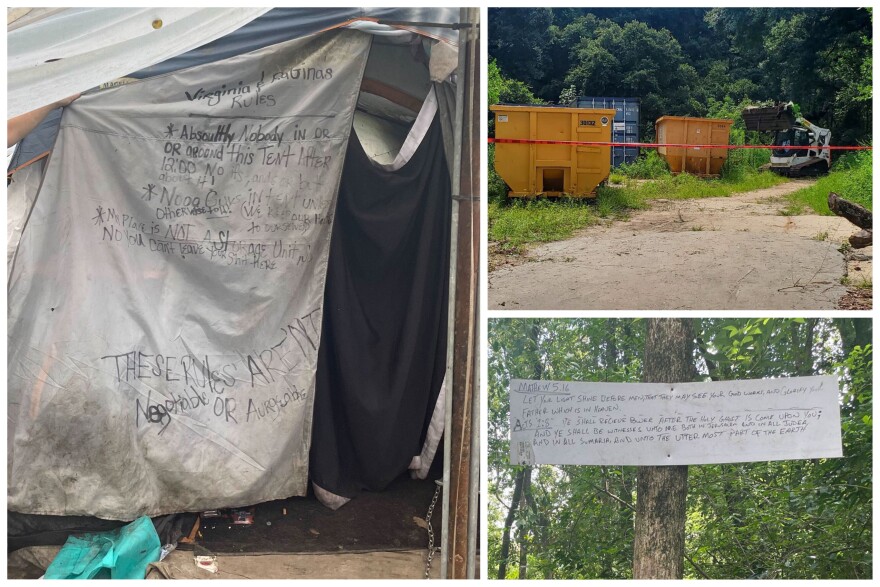Clean up has begun at an encampment on Murphy Road and Beggs Lane in Pensacola. Although trespass warning signs were posted last month, no one has been removed from the property.
“I’m glad it’s being cleaned up, it is horrible that people are living in those conditions,” said Sherri Myers, board member of Fearless Community, a homeless outreach organization.
Support Local Stories. Donate Here.
Volunteers with Fearless Community have cleaned up more than 1.55 tons of trash from the encampment since the beginning of the month. According to Myers, the campers living on the property have rights to stay there — for now — since the county does not have adequate housing or shelter space available.
“Squatters rights definitely come into play,” said Myers. “They have been allowed to live there, some as long as a decade.”
The property is owned by the Merrill Land Company. Calls to property owner Collier Merrill for this article were unsuccessful, however, in a previous interview, Merrill said the situation is a “double-edged sword” as the property had gotten out of hand and nearby residents were complaining about the trash and noise from the campers.
Fearless Community sent a letter to Merrill Land Company saying the campers “have rights to a civil process before they can be evicted.”
“The fact that you have known about the squatters living opening [sic], and with implied permission, will defeat any action you may bring to charge them with criminal trespass,” the letter continued.
“The Swamp”
Campers call the property “The Swamp.” It’s an apt name — it’s hot, humid, and muddy. Many of the campers are covered in mosquito bites, said Myers.
But to the unhoused people who’ve been living there, its home.
Johnny Linton and Stephanie Coar are a couple who have lived on the property together and separately on and off for more than five years.
RELATED: Dozens of unhoused people will be trespassed from homeless camp
“We’re just not going to go anywhere unless we have to,” said Coar. “(We’ll) try to do better than whatever we’ve been doing that’s causing issues.
“I understand there’s places where people aren’t supposed to be, but the biggest question I have is where can a homeless individual be other than jail? We are alive and we are out here. And if we don’t choose to get back into a home … where can we be that we are not bothering someone?”

Homeless advocate and Director of the Alfred Washburn Center Michael Kimberl had been trying to rent the property from Merrill Land Company and manage the camp, much like he does with another encampment called Sean’s Outpost.
“They could lease us the property, we could then regulate the property, keep it clean, and there wouldn’t be the complaints that they are currently having,” said Kimberl. “They did not seem interested in that whatsoever. No one wants to be on this property. There’s no reason to fight for this property, other than the fact that they don’t like the people who are on the property.”
On Wednesday, the Merrill Land Company put up signs saying that residents would be arrested for trespassing.
Going forward, Fearless Community intends to provide legal defense for anyone who may be given a criminal trespass on the property. Because the area is private property, the end goal, said Myers, is to find housing.
Escambia County Sheriff’s Office was on site for the clean-up, but did not remove anyone. They did make contact with campers to alert them of the clean-up. Anything campers didn’t want hauled away needed to be identified.
“The Sheriff’s office did a great job of sending the right deputy,” said Myers. “They showed compassion and sensitivity in what could’ve been a very volatile situation.”

‘Where can we go?’
Catherine Hoffer has been living in Pensacola since 2010, and at The Swamp in particular for a year and a half. She’s put a lot of work into her camp.
“I made a circular driveway, I made trails to get firewood, and I got the best looking fire pit out there,” she said. “Some of us cared about our stuff. My yard wasn’t an ashtray, you wouldn’t find a cigarette butt in my yard. I worked really hard, and I was very clean. I’m proud of it. So I’m going to miss it.”
Hoffer also takes care of some of the cats who live on the property – there’s Tabitha, who belonged to another camper, Samantha, and Nosy Rosie.
For two years, many unhoused people took to the I-110 overpass to set up camp. The area was cleared in 2022, so the Blake Doyle Skate Park could be built. Some of the people who lived under I-110 later moved onto The Swamp.
“I’d say around 90% of the people living here now lived at tent city,” said Virginia Plant, referring to the I-110 encampment. Plant has lived at The Swamp for more than a year.
Plant came to The Swamp fleeing an abusive home environment, with a couple bags and a dog with eight puppies. In the last year, she’s done everything she can to clean up the area of trash, and clean up abandoned camps. The dogs have been surrendered to Escambia County Animal Shelter.
Plant isn’t sure what her next move will be when she has to leave The Swamp.
“Nobody has anywhere to go, and honestly, the question is where can we go? Where can we go where we can be safe and not have something taken from underneath us? We already had our homes taken from underneath us. What else can they do to us?”
“I just want to go somewhere I feel safe. I want to go home.”

